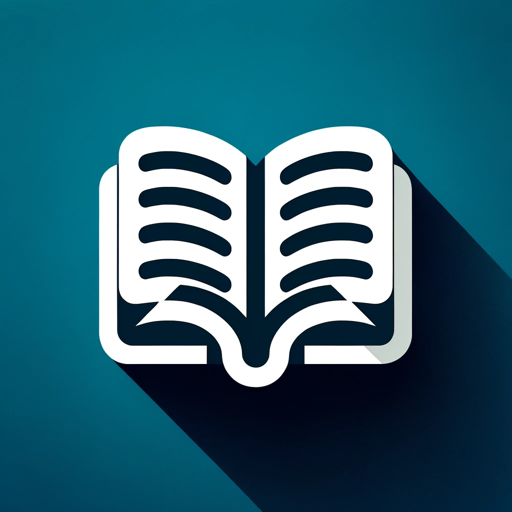Scholarly Review-academic book summarization
AI-powered academic book summaries.
Step 1. Upload a book. 25MB is the size limit.
Step 2. Ask to Summarize
Step 3. Enjoy!
Step 4. Tell your friends :)
Related Tools
Load More
Scholar
Optimize research with access to 200+ Million resources, incorporating essential critical reading skills. Seamlessly connect to Google Scholar, PubMed, JSTOR, Arxiv, and beyond. @Scholar

Academic Research Reviewer
Upon uploading a research paper, I provide a concise section wise analysis covering Abstract, Lit Review, Findings, Methodology, and Conclusion. I also critique the work, highlight its strengths, and answer any open questions from my Knowledge base of Ope

Literature Review Writer
Generate high-quality literature reviews fast, Summarize papers, identify key themes, and synthesize conclusions

Literature Review
Summarise and do literature reviews on academic papers

Academic Literature Review Builder
Writes main argument in referenced academic paragraphs.

Research Reviewer
I write paper review. Conversation data is NOT used to improve GPT.
20.0 / 5 (200 votes)
Introduction to Scholarly Review
Scholarly Review is a specialized tool designed to enhance the accessibility and understanding of academic books by providing detailed, chapter-by-chapter summaries. The primary purpose of Scholarly Review is to distill complex academic content into clear, concise summaries that capture the essence of each chapter. By breaking down large texts into manageable segments, Scholarly Review enables users to grasp the key ideas and arguments presented in academic works without having to read the entire book. For instance, a graduate student working on a literature review for their thesis can use Scholarly Review to quickly extract the main points from multiple academic books, saving valuable time and effort.

Main Functions of Scholarly Review
Chapter-by-Chapter Summarization
Example
A researcher working on a paper about climate change needs to review several books on the subject. By uploading these books to Scholarly Review, they receive detailed summaries of each chapter, allowing them to identify the most relevant information quickly.
Scenario
This function is particularly useful in academic research where time is limited, and a thorough understanding of multiple sources is required.
Segmented Content Summarization
Example
A student preparing for a comprehensive exam needs to study various topics covered in a large textbook. Scholarly Review can break down the textbook into 1000-word segments and provide summaries for each, making it easier to review and memorize the content.
Scenario
This function benefits students who need to digest large volumes of information systematically.
User-Controlled Summarization
Example
A professor preparing lecture notes wants to focus on specific chapters of a book relevant to their course. Scholarly Review allows them to receive summaries for selected chapters, ensuring they have the most pertinent information for their lectures.
Scenario
This function is ideal for educators who need to tailor content to their curriculum and teaching objectives.
Ideal Users of Scholarly Review Services
Academic Researchers
Researchers benefit from Scholarly Review by obtaining concise summaries of multiple academic books, allowing them to quickly identify key themes, arguments, and data relevant to their studies. This saves time and enhances the efficiency of the research process.
Students
Students, particularly those in graduate and postgraduate programs, find Scholarly Review invaluable for studying and preparing for exams. It helps them grasp complex concepts and review large amounts of information in a structured manner, aiding in better understanding and retention.

How to Use Scholarly Review
1
Visit aichatonline.org for a free trial without login, also no need for ChatGPT Plus.
2
Upload the academic book or document you want summarized. Ensure the file is in a compatible format, such as PDF or Word.
3
Scholarly Review will check the size of your upload and automatically divide it into chapters or 1000-word segments for processing.
4
Review the summary provided for each segment or chapter. After each summary, you will be prompted to continue with the next segment.
5
Use the summaries to enhance your understanding of the material, for study purposes, research, or to assist in writing academic papers.
Try other advanced and practical GPTs
ChatSEO
AI-powered SEO Content Creation Tool

Unreal Engine Assistant
AI-powered assistant for game development.

HealthyGamer GPT
AI-powered mental health guidance tool.

Image Generation with Selfcritique & Improvement
Iteratively enhance your images with AI
FL Studio Guru
AI-powered music production companion.

Bubble Buddy
AI-powered insights for Bubble.io app-building.

AI GPT Business Educator
AI-powered business enhancement tool.

Resolve Buddy
AI-powered DaVinci Resolve Assistant

Japanese Tutor
AI-powered tool for mastering Japanese

Website Roaster GPT
AI-powered website critiques with humor.

Vogue Vault
AI-powered tool for sourcing luxury fashion.

✨ PixelGenius
AI-powered Photo Editing Excellence

- Research
- Analysis
- Summarization
- Review
- Study
Q&A About Scholarly Review
What types of documents can I upload to Scholarly Review?
You can upload various types of academic documents including books, research papers, and dissertations in formats such as PDF and Word.
How does Scholarly Review ensure the accuracy of its summaries?
Scholarly Review uses advanced AI algorithms to analyze and distill the essence of each segment, focusing on capturing key concepts and important information accurately.
Can I customize the length or detail of the summaries?
Currently, summaries are generated based on chapters or 1000-word segments to balance detail and conciseness, but future updates may include customization options.
Is there a limit to the size of the document I can upload?
While there are no strict size limits, very large documents may take longer to process. It's recommended to upload documents in manageable chunks if they exceed 500 pages.
Can Scholarly Review handle non-English documents?
Yes, Scholarly Review supports multiple languages, providing summaries for academic content in various languages with high accuracy.